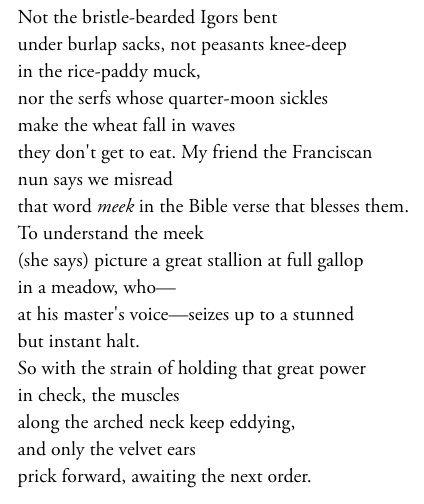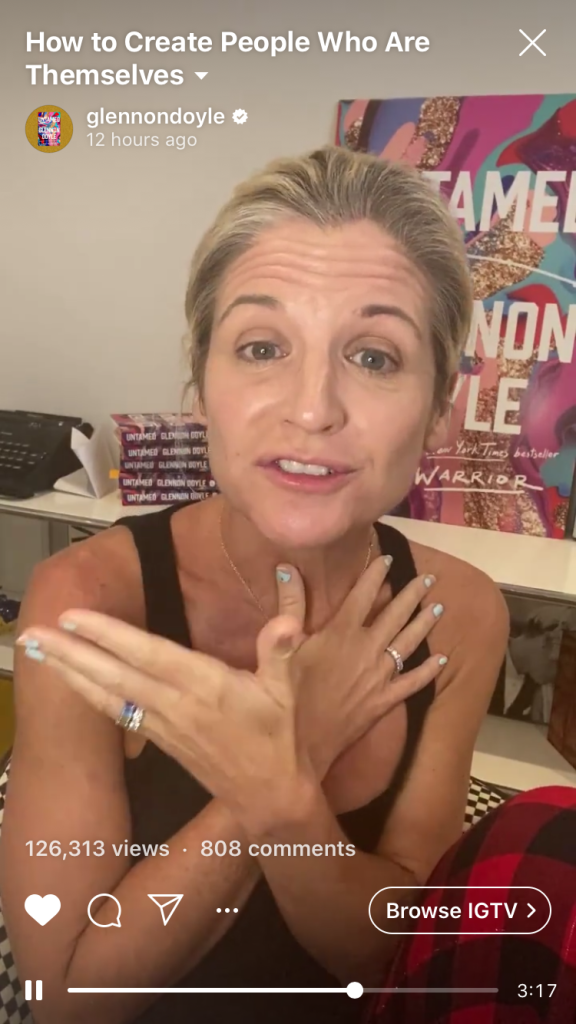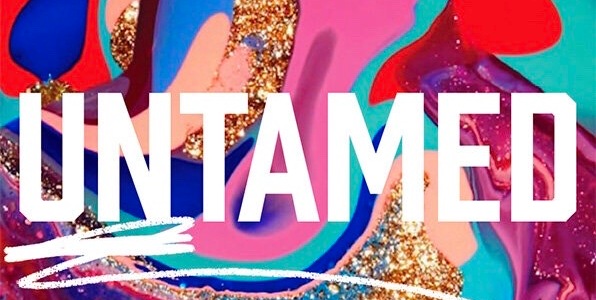Glennon Doyle’s Feminist Spirituality
I picked up Glennon Doyle’s new book Untamed at the recommendation of a friend who wrote to me in response to my Rebecca Solnit post. I was hoping, as I do when I pick up new memoirs, to escape into Doyle’s life for a few hours. I especially wanted to hear about Doyle’s marriage to soccer god Abby Wambach.
I soon found that Doyle’s purpose was not to rehash her story, but to ask me to reflect on my own. Her overarching goal — written in short, fiery bursts — is to teach women “untame” themselves, i.e. to challenge the external structure (*cough* patriarchy) that has molded women into a common, unhappy shape.
The task that follows recognition, per Doyle, is to remake oneself according only to an inner sense of the good. Doyle calls this her inner Knowing.
“So instead of asking ourselves what’s right or wrong, we must ask ourselves: What is true and beautiful? Then our imagination rises inside us, thanks us for finally consulting it after all these years, and tells us a story.”
Glennon Doyle, Untamed

Based on the style of Untamed and Doyle’s corresponding social media presence, one might say that Doyle has become more preacher than memoirist. Rather than dwell on her long journey through pain and chaos, by which she finally arrived in the light, Doyle spends most of her time sharing the light she has found. Each short chapter of Untamed reads like a sermon, beginning with a personal anecdote and moving into a generally applicable metaphor about life, truth, and being human.
What makes Doyle unique, of course, is that she preaches to women, and the higher power she points them towards is found within.
No topic, question, or situation is excepted from the filter of Doyle’s inner Knowing; nothing is left to any external authority. Not even (or perhaps, especially not) the Bible. According to Doyle, the moral of the Adam and Eve story in Genesis is not “when a woman wants more, she defies God, betrays her partner, curses her family, and destroys the world.”
Instead, Eve’s is a story of creation that begins with self-trust (replacing blind obedience), by which humanity enters into continuous, refining process of regeneration that is Life itself:
“Maybe Eve was never meant to be our warning. Maybe she was meant to be our model. Own your wanting. Eat the apple. Let it burn.”
-Glennon Doyle, Untamed
Even John Milton, who would probably disagree with this take on Eve, would have to affirm Doyle’s right to filter the Bible through her inner Knowing. In 1644, in late-Reformation England, he argued against literary censorship in Parliament, saying:
“Truth is compared in scripture to a streaming fountain; if her waters flow not in a perpetual progression they sicken into a muddy pool of conformity and tradition.”
And further:
“The light which we have gained, was given us, not to be ever staring on, but by it to discover onward things more remote from our knowledge.”
John Milton, “Areopagitica”
Doyle is not the first feminist to reinterpret Eve’s act as laudable. I found an archived New York Times article from the 1972 reporting on a feminist religious service in which the attendees recited the following in unison: “We hold that Eve performed the first free act.” But Doyle may be the first to help answer the question that follows after such an assertion: What next?
* * * *
In a gender studies class during my junior year of college, we read an article that posited that Christian notions of morality are primarily helpful for men seeking to become whole. For example, in my husband’s favorite Gospel narrative “The Sermon on the Mount,” (Matt. 5-7) Jesus teaches men to recognize the beautiful, undervalued capacities they have for building the kingdom of God; qualities tamed by patriarchal norms of masculinity. Jesus enumerates them as follows:

It’s hard to imagine, based on the way Jesus operated, that he was speaking to a crowd of destitute mourners — gentle, merciful, and fighting for righteousness, when he first taught the Beatitudes. He was not known for preaching to the choir, as it were. He was known for challenging everything people thought they knew about God and religion. Surely, when he gave the Sermon on the Mount, Jesus was speaking to a group of people who were not expecting to hear this message. Perhaps his audience was men in power, out of touch with the suffering masses; out of touch with strengths within themselves that might change their society for the better.*
*(As I have been taught, the book of Matthew was written for a well-educated, monied Jewish audience.)
Clearly, the Beatitudes are not an assertion of patriarchal masculinity, but rather a call to its opposite. It’s strange, then, that the male keepers of the Christian tradition have applied the Beatitudes to women to uphold their secondary, subjugated, tamed condition within patriarchy. This message might be summarized as: “You are already virtuous, you who suffer and are subjugated, so keep doing what you’re doing.” According to a NIV bible I recently acquired (for research purposes…) called “The Woman’s Bible,” the “Beatitudes for Women” are as follows:

The “description” column is surely not advising a woman to leave her unfulfilling marriage to a man, upset her three children, and marry a woman, as Doyle did.
As I see it, there are a few approaches for untaming our understanding of God — particularly as women inheriting a patriarchal spiritual tradition. We can (1) change how we read the words of our spiritual texts; (2) keep some pieces and toss others; or (3) put aside the old texts and teachers and spend time in learning from newly untamed, female spiritual teachers.
One writer who works to challenge common interpretations of the Bible is Mary Karr. In her poem “Who the Meek are Not,” Karr redefines meekness as follows:

My now-husband, Thom, borrowed Sinners Welcome from me when we were seniors in college just getting to know one another. When he returned it, he highlighted this poem as one that had really resonated with him.
I had never taken particular notice of it, but I liked his noticing of it. Four years later, I can see how Karr’s portrayal of meekness describes Thom and how he moves through the world. There is great power within him — occasionally unleashed on the dancefloor — but he spends most of his time holding it back, listening intently.
It strikes me now that in order to understand Karr’s vision of meekness, one has to know what one is capable of. A woman must learn her unique strengths in order to exercise them. She must know recognize her power in order to check it. Doyle’s goal, in Untamed, and in preaching to women who follow her on Instagram, is to teach them to find the stallion’s great power within. (Except in her metaphor, it’s the cheetah.) Without knowing wildness, one cannot practice true meekness. It is useless for a woman to listen for the call of her inner Knowing if she does not believe in her ability to respond to it.
I have tried many times to figure out how to make the Bible speak to me without the impediment of patriarchy, or even the assumed-male reader. For example, I recently tried to change all of the pronouns in Proverbs:


This is where it got weird and I gave up.
After reading Untamed, I’m ready to put down project of re-writing the Bible and instead to let Glennon Doyle, and others, be my teachers for a little while. Beginning in late March, Doyle began conducting “morning meetings” on her Instagram, in which she spends approximately 10 minutes talking to her followers about her current emotional and/or spiritual state and offering wisdom.
I have started tuning into these meetings. Although the material is often repeated content from the book (likely spurred by having to cancel her release tour due to COVID-19), she makes it new for the day at hand. Occasionally we get to hear from Abby Wambach, too. One can tell that Doyle feels great responsibility for the spiritual wellbeing of her readers and followers. For a writer, this daily communing and encouragement is certainly above-and-beyond. I find myself in admiration of it, of her.

To close, I encourage anyone, especially women, to check out Untamed. And I offer its author, Glennon Doyle these rewritten Beatitudes:
Blessed are they who seek what is true and beautiful,
For they shall find it.
Blessed are they who listen to their inner Knowing,
For God is within them.
Blessed are they who see and challenge their taming,
For they shall be untamed.

Blown away. Fallon would be proud of the Areopagitica reference. Keep WRITING!
LikeLiked by 1 person
Aw thanks, Josh! For some reason I still have that giant Milton collection from college… so just had to lol.
LikeLike
Commenting on someone post who is an English major is a little scary for me. When my brain starts to flow, I just write and only sometimes do editing. I prefer the flow but then again I understand my flow. I will check out Untamed for I love to read authors I have read before. Interesting title for her book. I have great freedom in the Lord, wondering if that is the same as untamed. I know for sure i have been live like a tamed cat when I was into pleasing my husband too much, wanted to be like Him. In the last 10 years, God has released me from some of that bondage and I sense my freedom growing. But then again, I am 73 and lived a lot of life so maybe it just took growing older. Blessing and good read on your post.
LikeLiked by 1 person
Opps, I meant to say, love to read authors I have not read before…see , thats what no editing does. Sorry English teacher.
LikeLiked by 1 person